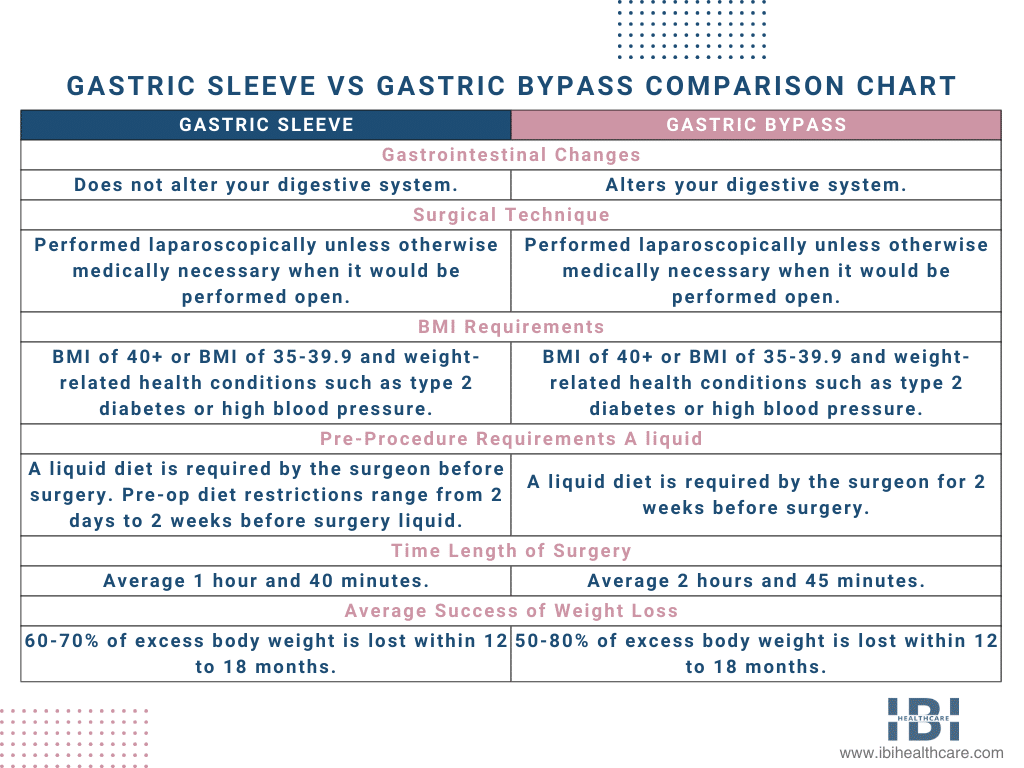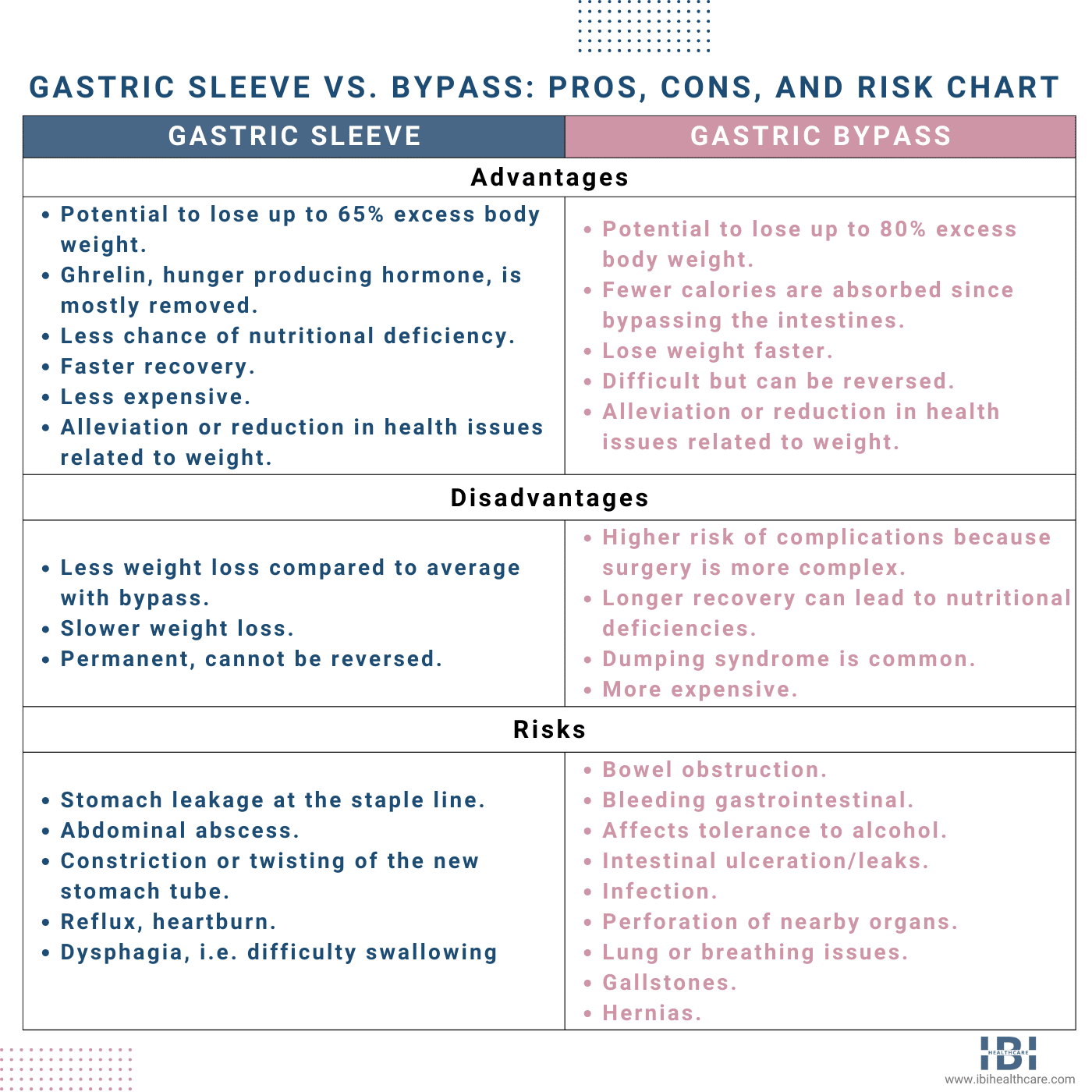People who are considering having weight loss surgery to combat obesity and related health conditions have several different procedures they can consider. With the many advancements in bariatric weight loss techniques over the past few years, there are now surgical options as well as non-surgical options available. Below is a comparison between traditional gastric sleeve vs. gastric bypass surgeries highlighting the success rates, benefits, risks, and pros and cons of each so you can make an informed decision if either may be right for you.
Difference Between a Bariatric Sleeve and a Bariatric Bypass
Gastric sleeve and gastric bypass are the two most popular bariatric surgeries that have things in common but are done differently.
During gastric sleeve surgery, 80% of the stomach is permanently removed. The surgeon then sutures the remaining portion into a small pouch or sleeve.
During gastric bypass or Roux-en-Y gastric bypass (RYGB), the surgeon creates a small pouch by bypassing most of the stomach and the part of the small intestine that absorbs most of the calories. The pouch is attached to the end part of the small intestine.
Gastric Sleeve vs. Gastric Bypass Comparison Chart

Both of these bariatric procedures have been around for decades and both are well-known procedures that can produce significant weight loss in patients with relatively low-risk factors. Any surgery brings with it risks as well as pros and cons. It’s important to understand and consider these before committing to any procedure.

Who is a Candidate For Bariatric Gastric Sleeve vs. Gastric Bypass?
For higher-weight individuals, gastric sleeve or gastric bypass surgery. It can help them lose weight as long as they are committed to the process. There may be some slight advantages of one surgery over the other for different types of patients.
Gastric Bypass Candidates
Bypass surgery is a more invasive surgery but it also helps patients lose between 10 and 20 lb more than the gastric sleeve procedure due to the way the digestive system is re-routed.
- Patients who are experiencing extreme cases of diabetes may benefit slightly more with this weight loss surgery over gastric sleeve although both surgeries will alleviate and sometimes eliminate the symptoms of diabetes.
- Patients who are suffering from severe reflux disease are often better candidates for gastric bypass.
Gastric Sleeve Candidates
Gastric sleeve surgery is less invasive than gastric bypass surgery and carries only a 3% risk for complications.s the 5% risk associated with the gastric bypass procedure. The surgery time is shorter as well as the recovery time so it may be better for patients who are intolerant to general anesthesia or individuals who are high-risk surgically speaking. Read our full article on what makes you a good candidate for a gastric sleeve procedure.
- Patients who have had multiple abdominal surgeries and possibly scar tissue related to those procedures would be better candidates for gastric sleeve surgery. Scar tissues could inhibit the surgeon’s ability to re-route the digestive system during a bypass.
- Patients that are severely higher in weight, i.e. 450-500 pounds, would be better candidates for gastric sleeve surgery because their excess fat could limit the amount of space the surgeon would have to work within if attempting to re-route the digestive system through a bypass.
- Gastric sleeve is the better choice for individuals dependent on medication for psychiatric illness. Bypass surgery can change how the body absorbs and distributes medications and may harm a patient with depression or anxiety.
What if You are not a Candidate For Either Gastric Sleeve or Gastric Bypass Surgery?
Sometimes patients are not candidates for bariatric surgery due to medical reasons, physical limitations, or BMI requirements. There is a procedure that can help these individuals lose weight. Without having to undergo the risks associated with a surgical procedure.
Endoscopic Sleeve Gastroplasty (ESG)
Doctors perform Endoscopic Sleeve Gastroplasty or ESG, a non-surgical gastric sleeve procedure. By lowering a special instrument down the patient’s throat. This instrument looks like a thin flexible tube. It has a special tiny camera and also enables the insertion of other necessary special surgical instruments through the tube to perform the procedure.
During the gastric sleeve procedure, the surgeon uses a special suturing device. Consequently, reshape the patient’s stomach into a small sleeve-like pouch held together by stitches. Regardless, the procedure reduces the patient’s stomach to about 25% of its original size. It helps the patient feel “full” for a longer period. Also obliges them to eat very small portions during a meal. The physical results of ESG are very similar to that of gastric sleeve surgery. But without the incisions and risks or complications of a surgical procedure.
Patients can lose a significant amount of weight with ESG without undergoing surgery. There is no hospital stay necessary and a short recovery time of a week to ten days.
If you are suffering from obesity and/or health issues related to your weight. Above all, considering gastric sleeve vs. gastric bypass surgery contact IBI Healthcare Institute for a consultation today.
Every person is different and every surgery will not offer the same results to each patient. Consulting with an expert bariatric surgeon would be the best first step. IBI Healthcare Institute is here to help answer your questions. To provide you with detailed information, tailored to your circumstances, to help you make an informed decision.











